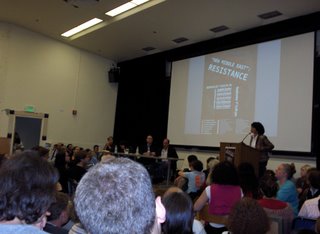A good friend of mine and loyal reader of this blog took issue with the cut-up of the Berkeley Teach-Ins Against War event, that I posted late on Thursday night. He charged that instead of crudely bashing the speakers, I ought to have engaged the "complex arguments" presented by them. I regret to say that I will not be able to do that. I simply did not hear any such arguments. Perhaps I entered the event with the wrong kind of attitude. But I came away with a very different impression of the teach-in than my friend.
It is true that the various panelists repeatedly pointed to the large number of Lebanese civilian deaths caused by Israel Israel
Let me begin from the end. Ironically, during the question period after the five speakers had finished, one member of the audience asked Judith Butler why she had included any critique, however weak, of Hizbullah in her discussion. She responded with an astounding statement that N has already cited. “Understanding Hamas and Hizbullah as social movements that are on the global left is important,” she said, “but [it] doesn’t stop us from criticizing them.” I know that some of our readers would applaud such a statement. For them, the global left, in any case, represents hypocrisy, foolishness, terrorist appeasement, and antisemitism. But despite all the terrible things I have seen among movements that identify themselves as “leftist,” I still believe that the “global left” stands or ought to stand for values that are diametrically opposed to those of these two organizations.
In fact, speaker after speaker at the teach-in, made efforts to embrace Hizbullah as part of a “left” opposed to the right-wing forces represented by the US and Israel. Thus, Charles Hirschkind, claimed that “since the end of the occupation, most of [Hizbullah’s] activities have been focused on social services,” and that the movement “increasingly showed itself to be a positive force,” with no desire to create a theocracy in Lebanon United States Egypt
Like a number of other panelists that night, Hirschkind scoffed at the notion that Hizbullah is a terrorist group. “The label ‘terrorist’ is radically inaccurate for describing resistance,” he said. Indeed, Hirschkind’s argument continued, most “terrorists” in the Middle East are not really terrorists, and certainly not Muslim fundamentalists. Suicide bombers share a commitment to resisting foreign occupation, not to Islamism. And suicide bombings are “the strategy of the weak against vastly more powerful adversaries,” which have nothing to do with “a culture of death.”
Saba Mahmood, who opened the talk, also did her best to rehabilitate Hizbullah. In a list of impressive achievements of the Lebanese in recent years, she included “successfully driving out the Israelis.” Of course, Hizbullah has claimed that particular achievement all for itself, so that heralding it as impressive, is another way of giving the organization kudos. But more perversely, she argued that Hizbullah had contributed positively to fashioning a new political ethic in Lebanon Lebanon Lebanon
Zaatari’s talk, as N has already written, was the most blatantly propagandistic among the five that night. She extolled Hizbullah’s services, and reiterated that “its interest has always been driving out Israel Israel had taken from Lebanon Israel was a hostile act not just against the Palestinians but also against other Arabs,” she said, “Lebanon Lebanon , the 1923 border demarcation assigned them to Mandatory Palestine, and the UN recognizes them as belonging to Israel Israel “stole,” is embraced by the most ardent rejectionists in Lebanon Israel

No comments:
Post a Comment